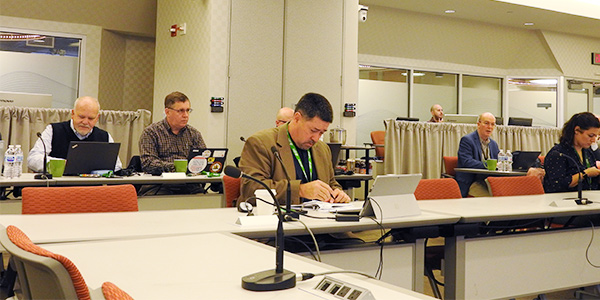By Christen Smith
VALLEY FORGE, Pa. — PJM asked for stakeholder feedback last week about how to reshape its gas pipeline contingency plan, three months after FERC turned it down for lacking specificity and clarity.
“We talked with FERC staff to get a read on what they want to see in a new proposal,” Thomas DeVita, PJM senior counsel, told the Market Implementation Committee on Wednesday. “We got an insight to their thinking. … The key point is the commission wants to see a meeting of the minds between generators and pipelines.”
On Feb. 19, FERC rejected the stakeholder-approved mechanism that would have implemented a process for market sellers seeking cost recovery for certain gas contingencies associated with the RTO’s instruction to temporarily switch to an alternative fuel or alternative fuel source because of pipeline breaks or the loss of compressor stations (ER19-664). The proposal included nine cost categories of switching costs, including park-and-loan service charges and overrun charges.
The commission said PJM’s definition of penalty was “unreasonably narrow and unsupported” because pipeline tariffs delineate between penalties and fuel-switching costs in different ways, meaning what appears to be an appropriate cost for one pipeline could be considered a penalty for another. FERC also faulted PJM for not including events that might trigger fuel-switching directives in its Tariff and for lacking procedures for dealing with such contingencies through the Capacity Performance market design. (See FERC Rejects PJM’s Gas Contingency Pipeline Proposal.)
DeVita said commission staff discouraged PJM from submitting an itemized list of switching costs, as it did in the first filing, and instead focus on procedures surrounding “explicit authorization” to switch between pipelines and any new limitations on the amount of gas burned after the switch occurs. Rich Brown, manager of PJM’s system operator training, said FERC’s focus on authorization and fuel burned reflects the commission’s insistence on ensuring reliability is maintained during any switch.
David “Scarp” Scarpignato of Calpine said that approach would not protect his company’s interests.
“I’m not comfortable that we just leave it open and send it to FERC with no guidance on what’s a coverable cost and what’s not,” he said. “Just getting over the hurdle of notice is not enough to give us confidence that our costs will be recovered.”
In a January filing with FERC, Duke Energy and East Kentucky Power Cooperative said they generally supported the idea of compensating generators for switching fuels, but they worried that PJM’s enumerated categories didn’t capture all the possible costs. Without an exhaustive list, they said, generators lacked financial incentive to make the switch or the ability to recoup expenses after-the-fact.
Marji Philips, Direct Energy’s director of RTO and federal services, told the MIC that if generators know PJM will order the switch — instead of generators making the call themselves — the cost of fuel switching is transferred to customers instead. The filing isn’t clear as to whether generators who can’t perform will incur CP penalties, either, she said.
“This is so fundamentally flawed,” Philips said. “It is not pipelines that do the switching. It’s whoever owns the capacity on the pipeline. We need to rethink this and reframe how we think about this.”
The Independent Market Monitor and the PJM Industrial Customer Coalition further alleged that the RTO’s gas-electric coordination remains an information-sharing process, therefore PJM can’t give operational instructions to pipelines. Moving customers with firm contracts off some pipelines — while others with lower levels of service remain unaffected — may discourage the former group of market sellers from taking proper steps to obtain reliable back-up fuel sources, they said.
The D.C. Office of the People’s Counsel crafted the Operating Agreement and Tariff changes detailed in the rejected filing after earning a majority of stakeholder support at the December meeting of the Markets and Reliability Committee.
The supermajority vote was a victory for load interests who opposed a Calpine-authored plan endorsed at the MIC in November. That proposal would have developed a formula for cost recovery to be filed with FERC that did not include pipeline penalties.
Although ongoing services generally include cost recovery formulas, DeVita said FERC may interpret the “rare” event of generators seeking fuel-switching reimbursement as incomparable.
“We are very concerned about cost to load,” said Adrien Ford of Old Dominion Electric Cooperative. “We are also very concerned about generators mitigating their own risk. We are in no man’s land now.”





